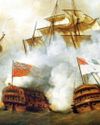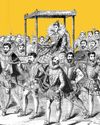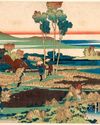
What is the situation in China when Mao dies?
Mao died in 1976 at the end of ten years of what is generally referred to as the Cultural Revolution. This was a period of endless witch-hunts, purges and campaigns in which people proved their loyalty to Mao by denouncing friends, neighbours and even relatives. Economically, under Mao the country was a command economy, like all socialist countries at the time, but it was also an extraordinarily isolated economy. Throughout the Cultural Revolution the Chairman promoted the notion of self reliance, leaving China cut off from the rest of the world, including from what was known, at the time, as the 'socialist camp'. By the time he died the living standards of ordinary people were lower than what they had been in 1949. So by 1976 the country was confronted by two major issues. One was political, as thousands of highly placed party members were still imprisoned, under house arrest or banned from office as a result of the Cultural Revolution, including of course Deng Xiaoping. The other was economic, with a system incapable of addressing even the basic needs of the population.
Who is Mao’s successor and what is the political aftermath of the Chairman’s death?
A coup followed his death, as Mao’s wife Jiang Qing and three of her fanatical followers, a group generally referred to as the Gang of Four, were arrested. Shortly before his death, Mao had appointed Hua Guofeng, but he lacked charisma, never mind a firm grip on the levers of power. He was also extremely unwilling to re-examine the cases of the thousands of high-ranking party members who were victimised during the Cultural Revolution. The result of the pressure from those around him was the rehabilitation of Deng Xiaoping, who in December 1978 gained overall control over the machinery of the state.
This story is from the {{IssueName}} edition of {{MagazineName}}.
Start your 7-day Magzter GOLD free trial to access thousands of curated premium stories, and 9,000+ magazines and newspapers.
Already a subscriber ? Sign In
This story is from the {{IssueName}} edition of {{MagazineName}}.
Start your 7-day Magzter GOLD free trial to access thousands of curated premium stories, and 9,000+ magazines and newspapers.
Already a subscriber? Sign In

STALIN HAD CONTINUED WEST AFTER BERLIN?
Having used the Allies for his own ends, the Soviet dictator plots to overthrow the rest of Europe

THE GLORIOUS FIRST OF JUNE
ATLANTIC OCEAN, 400 NAUTICAL MILES WEST OF USHANT 28 MAY - 1 JUNE 1794

LIFE AS AS A GODDESS
Jasmine Elmer uncovers the complexity and darker sides of ancient deities and delivers history with soul

TUDOR FASHION TIPS
From farthingales and ruffs to codpieces, ten ways to achieve the styles of the Tudor court

THE FIRST AMERICANS
Discover indigenous life before the colonists landed

THE LAVENDER SCARE
How a national fear of communism led to the American government outing and firing thousands of gay and lesbian workers

STARS BEHIND THE BARS
Ten iconic celebrity mugshots and the stories behind them

The Making of JAPAN
The rise of imperial power and a flourishing of the arts and culture in the Land of the Rising Sun can be traced back to the Asuka period

SIEGE OF TOULON
TOULON, FRENCH REPUBLIC SEPTEMBER-DECEMBER 1793

REDISCOVERING THE FORGOTTEN LIVES OF QUEER MEN
We speak to the editor of a groundbreaking new collection that uncovers what life was like for gay men when homosexuality was illegal in Britain